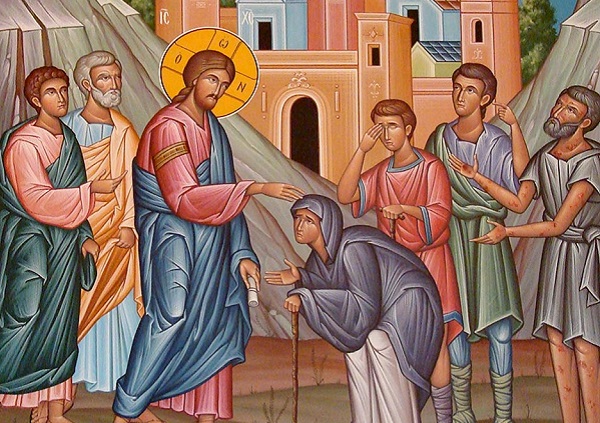Form and Substance (Luke 13, 10-17) (Archimandrite Nikanor Karayannis)
11 Δεκεμβρίου 2017
Today’s Gospel reading is a clear and stark indictment of formalism in religion. Saint Luke tells us that Christ cured someone on the Sabbath and this was cause enough for Him to come into conflict with the Judaism of His time, which had transformed the commandments of the Decalogue and the Law into a sterile system of obligations and restrictions. The absurdity of the reactions of the religious establishment was tragic. The leader of the synagogue was indignant that Christ’s miracle was performed on the Sabbath, the day of rest, appointed as such by God. So the message of today’s Gospel touches us and concerns all of us because often, and perhaps unconsciously, we prioritize certain religious or ritual forms without any concomitant effect on our heart and life. The cures Christ performed on the Sabbath day reveal the spirit of love and freedom which there should always be in the observation of God’s commandments. It should be said that, however, that, although the essential aspect transcends the mere form, that form is still necessary to the degree and extent that it protects and expresses the essence.

Form, love and freedom
As a tendency that people have to attach themselves to formalities and to deny the essence of things, events and situations, formalism is a pathological condition in our religious life. This human propensity is a form of enslavement of the spirit which, in the name of God, sets rules above people and their needs. Of course, we can’t imagine the smooth running and organization of society, or the structure of any religious life, without formal arrangements, institutions and laws. Freedom isn’t the indiscriminate and irresponsible infringement of the norms, but a preference for substance over form. This is why the preaching of Christ and the message of the Gospel must become wings raising us up to the life in God, not weights shackling us and suffocating our freedom and our soul. They should be steps in our exploration of the essence of things, not obstacles which entrap us and lock us into their formal aspects. For religious people in any era, external religious formality is certainly necessary, even crucial. It’s the touchstone that tests our internal relationship with God, ourselves and others.
It’s at precisely this point, when people don’t want to go down the path of loving sacrifice- which will cost them- that they close themselves off and retreat into external formalities- which costs them nothing. This is why formalism is attractive, though disastrous, because sterile piety is the half-measure of our facile religiosity. Where Christ’s truth is twisted and abused, in the end we’re left with its empty shell.
But another, worse danger lurks in any insistence on religious forms. This is a new form of idolatry, which is all the more terrifying when it’s implemented within the Church itself. It’s the substitution of Sabbath observance, that is, every external formality, for the love of Christ. This is something which should concern us greatly, so that we’re aware when we fall into the temptation of dwelling on the form and procedure and lose the spirit and love. In another instance, Christ said that the Sabbath was made for people, not the other way round (Matth. 2, 27). Today, alas, we see the triumph of the ‘Sabbath’ over the Son of Man. This triumph of formalism is often expressed through fanaticism and the fragmentation of the faithful into factions, which condemn everyone who thinks differently from them. They huddle together and exhaust their fervour on the correctness of formal rules and regulations, on the weight of restrictions and prohibitions and on the strictness of asceticism and the canons.
We should ask ourselves whether the formality of our piety corresponds to Christ’s commandment to love God and our neighbour. Within our piety, where is the human person for whom Christ came into the world? If, within the formalities of our piety, there’s love for God, how do we express our love for other people? The coming feasts are an opportunity for us to examine this. Amen.





